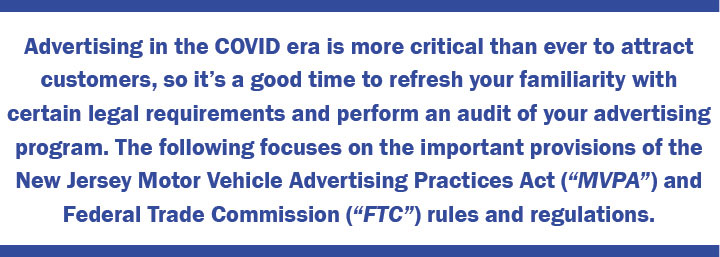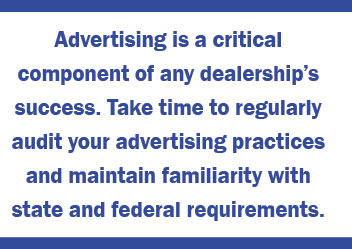By Michael P. McMahan, Esq., and Christopher T. Koenig, Esq.
It’s a pandemic, and your old sales methods may not be working. You’ve got to get people in the door, so you run all sorts of advertisements. It’s a crazy year, so anything goes, right? Wrong. State and federal regulators are watching closer than ever to ensure consumers are not hurt by businesses looking to make a quick buck. As dealers have been required to focus on COVID protocols to safely operate their businesses over the past year, it’s important not to forget about adherence to other regulatory compliance requirements.
Advertising in the COVID era is more critical than ever to attract customers, so it’s a good time to refresh your familiarity with certain legal requirements and perform an audit of your advertising program. The following focuses on the important provisions of the New Jersey Motor Vehicle Advertising Practices Act (“MVPA”) and Federal Trade Commission (“FTC”) rules and regulations.

1. Don’t pretend to be COVID relief. This one would seem obvious, and yet it still needs to be said. The Florida Attorney General and the FTC recently took action against an ad agency for creating a mailer for a used car dealer designed to look like a COVID-19 stimulus check. The outside of the envelope stated in bold text, “IMPORTANT COVID-19 ECONOMIC STIMULUS DOCUMENT ENCLOSED.” Inside was a mock check from the “Stimulus Relief Program.” The state and federal authorities are looking hard at businesses that try to take advantage of consumers during this time. Don’t try a “new angle” or something you think will get a lot of attention.
2. Don’t oversell your COVID compliance. In the COVID-19 era, the bottom line is the same as it is for any other advertising. When making statements, feel free to tout your efforts but don’t deceive and mislead consumers. For example, we recently found an ad where a dealership implied a special affiliation by stating that it was taking direct orders from the CDC to keep customers healthy. Making a comment like that only invites scrutiny. The better approach would have been to state We are following state and federal guidance to maintain a clean and safe environment, or, Our dealership is committed to your health and safety. It’s doubtful that either of these would be objectionable to state and federal regulatory authorities — as long as the dealership is actually practicing what it is preaching.
3. Digital advertising is advertising. The MVPA is simply stated but casts a broad net. That net covers any advertisement that is “uttered, issued, printed, disseminated, published, circulated or distributed” within or outside the State relating to the sale or lease of vehicles at in-state locations. Radio and television broadcasts, newspapers, signs, and the catchall “other publication” and “electronic medium” are specifically mentioned. In the digital age in which we live, it’s safe to assume that the MVPA covers many advertising tools available online. This includes email blasts, specials posted through social media, Google and Facebook ads, and even individual texts from employees and salespersons mentioning pricing and special deals to their longtime clients. (See N.J.A.C. 13:45A-26A.2).
4. Sell the goods you advertise. The MVPA takes dealerships to task for bait and switch advertising — offering a deal that seems too good to be true on paper, but that deal is nowhere to be found when the customer comes calling. The state presumes “bait and switch” advertising has occurred if any of the following occur: (i) the dealership refuses to show, display, sell or lease an advertised vehicle, unless it can be shown the advertised vehicle was actually sold; (ii) a deposit is accepted for the advertised vehicle, but the customer is unknowingly switched to a higher-priced unit; (iii) the dealership delivers an unwanted, higher-priced unit instead of the advertised vehicle and the customer is stuck paying the difference. (See N.J.A.C. 13:45A-26A.4).
5. Ads must meet unusual requirements. You may have come to expect that an ad must disclose the specifics of any vehicle offered for sale and the terms of any leasing deals, etc. But did you know that you must disclose whether a used car once was a taxi or a company car? (You must disclose non-personal use of used vehicles). Did you know that some ads must offer a toll-free number from 9 a.m. to 9 p.m., Monday through Saturday, to answer customer questions? How about that audible ads (radio, TV, internet video, podcast) must meet certain decibel levels and speed requirements? You can’t blast out your offers and speed whisper your terms and conditions. (See N.J.A.C. 13:45A-26A.5 and A.6).
6. The Thirteen Dirty Words. George Carlin once famously spoke about the seven words you cannot say on television. Here are the 13 words and phrases you should avoid using in advertising:
a. Authorized Sale
b. Authorized Distribution Center
c. Factory Outlet
d. Factory-Authorized Sale
e. Lowest Prices
f. Lower Prices Than Anyone Else
g. Lowest Prices of the Year
h. We Will Beat Your Best Deal
i. Dealer Cost
j. Factory Invoice
k. Floor Plan Balance
l. Wholesale
m. At No Profit
(See N.J.A.C. 13:45A-26A.7).
7. Make on-site disclosures and keep good records. Are you aware that the MVPA requires posting any advertisement that quotes a price for the sale or lease of a vehicle at the main entrance to the dealership where the vehicle is displayed, in proximity to where the vehicle is otherwise displayed, or actually on the vehicle itself? Alternatively, the dealership can attach a tag to the vehicle stating the advertised price and the applicable mandatory disclosures required by the MVPA. New vehicles shouldn’t be advertised without the Monroney label attached, and used vehicles shouldn’t be advertised without a properly displayed Used Car Buyer’s Guide. Advertised vehicles for sale or lease must be on the premises and available during the publication period. If sold during that period, records of the sale must be maintained, including a copy of the advertisement and any executed customer contract. All documentation must be kept for 180 days after the sale and made available for inspection by the Division of Consumer Affairs. Customers inquiring by telephone or in person about any advertised vehicle during the publication period must be informed if the vehicle was sold or leased. (See N.J.A.C. 13:45A-26A.9 and N.J.A.C. 13:45A-26A.10).
8. Disclose your credit terms and conditions. When it comes to the advertising of financed deals, the MVPA identifies unique disclosures required and unlawful practices that are prohibited. The total cost of the installment sale, the annual percentage rate, the monthly payment and number of payments, and the amount of any down payment or trade-in must appear adjacent to the advertised vehicle description. There are also specific requirements when using footnotes. Utilizing credit terms like easy credit or one-day credit is unlawful if not regularly offered in the normal course of business. The use or statement of an installment payment on anything other than a monthly basis is also illegal. (See N.J.A.C. 13:45A-26A.8). Scrutinizing credit and installment sale advertising is a central focus of the FTC.
9. Avoid the FTC. It’s not just state law you have to worry about, but federal law too. The FTC will label advertising unfair or deceptive if the following facts are true:
An advertising act or practice is unfair if it:
- Causes or is likely to cause substantial injury to consumers;
- Cannot be reasonably avoided by consumers; and
- Is not outweighed by countervailing benefits to consumers or competition.
An advertising act or practice is deceptive if:
- A representation, omission or practice misleads or is likely to mislead the consumer;
- A consumer’s interpretation of the representation, omission or practice is considered reasonable under the circumstances; and
- The misleading representation, omission, or practice is material.
Review your ads from the perspective of a consumer and examine content by putting each bullet point in the form of a question. For example, is it likely to mislead someone? If the answer is yes, rework the ad.
10. Comply with Reg M and Reg Z. There are two federal regulations, Reg M and Reg Z, describing certain “trigger terms” that, in turn, mandate the use of disclosures when advertising lease or credit transactions, respectively. Below is a brief explainer.
Leases are governed by Regulation M, also known as the Consumer Leasing Act. The FTC has the authority to enforce its provisions. As an advertiser, you need to be mindful of disclosures that must be clearly and conspicuously stated when specific trigger terms are used in a lease ad. Here’s what you need to know about staying compliant with Reg M requirements:
If your lease ad contains one of these trigger terms:
- A statement of any capitalized cost reduction or other payment required before or at lease consummation, or by delivery if delivery takes place after consummation, or that no payment is required; or
- The amount of any payment.
Then your ad must clearly and conspicuously disclose:
That the transaction is a lease,
The total amount due before or at consummation, or by delivery if delivery takes place after consummation,
The number, amounts and due dates or periods of scheduled payments under the lease,
Whether or not a security deposit is required, and
In leases where the consumer’s liability is based on the difference between the property’s residual value and its realized value at the end of the lease term, an extra charge may be imposed at the end of the lease term.
Regulation Z governs credit sale advertisements, often referred to as the Truth in Lending Act. The FTC has the authority to enforce its provisions. When advertising a credit sale, always ensure that the ad clearly and conspicuously includes specific disclosures when certain trigger terms appear. Here’s what you need to know about staying compliant with Reg Z advertising requirements:
If your credit sale ad contains one of these trigger terms:
- The amount or percentage of any downpayment.
- The number of payments or period of repayment.
- The amount of any payment.
- The amount of any finance charge.
Then your ad must clearly and conspicuously disclose:
- The amount or percentage of the downpayment.
- The terms of repayment reflecting the repayment obligations over the full term of the loan, including any balloon payment.
- The “annual percentage rate,” using that term or “APR,” and, whether or not the rate may be increased after consummation.
In short, you must be vigilant to ensure that your advertising practices and advertising content comply with specific federal requirements. It’s never enough to simply say that you complied with the MVPA and weren’t aware of the federal regulations. Advertising is a critical component of any dealership’s success.

Take time to regularly audit your advertising practices and maintain familiarity with state and federal requirements. Above all, don’t create advertisements that are deceptive and misleading. This is especially true during the COVID era, where taking the humble approach when describing your dealership’s efforts will steer you clear of unwelcome regulatory scrutiny.
Michael McMahan is a partner, and Christopher Koenig is an attorney, in Arent Fox’s Automotive Practice Group. They can be reached at 212-484-3900.
This story appears in Issue 4 2020-21 of the New Jersey Auto Retailer Magazine.







